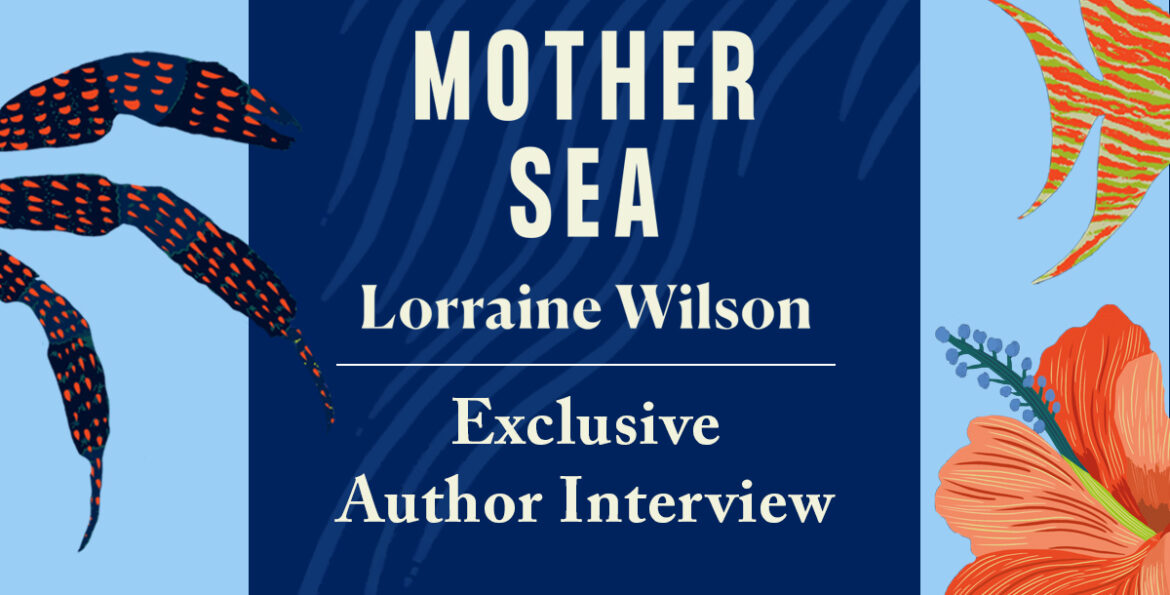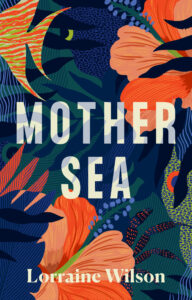

Lorraine Wilson: Interview
- 16th May 2023
- Category : Author,Interviews & Blogs
Lorraine Wilson is an ex-conservation scientist who writes fiction influenced by folklore and the wilderness. Mother Sea is set on a remote Indian Ocean island following climate scientist Sisi who is working hard to protect her home. With her community under threat, Sisi must fight to save her home, her people and her unborn child.
How did you start writing and what does writing mean to you?
I started writing when I had to step back from my career as a research scientist due to chronic illness. I’ve always loved reading and dabbling inexpertly in poetry, but when I stopped working I knew that for my mental wellbeing during this strange period of loss, I needed something as an outlet and a focus. I didn’t start out with any real intentions other than to explore this new skillset and see if it fitted around my parenting and my health, but luckily I fell in love with the art of storytelling, and found a wonderful online community of writers really quickly. I think because of where it all started, writing to me is always going to be less about the publishing side and more about the community and the joy. I will always be grateful to be published, and nothing quite beats the buzz of a reader just getting your book, but I write because I love creating stories that mean something to me, and I love feeling a small part of a community full of gorgeous, creative, thoughtful people. And perhaps writing will also always feel like a gift, because I found it during a really dark time and it has kept me whole.
Did you always want to be a writer?
No! I have always (and I mean always, I was reading The Hobbit at 4!) loved stories, and the power of storytelling to say something about the world. But I was entirely focussed on science and conservation until the moment I couldn’t be any more. Which is why it is such a blessing that discovering writing felt so much like coming home. There are more overlaps than you might think between science and creative writing, but I still feel like the artistic side of me has finally been allowed to breathe.
If you could describe Mother Sea in one word, what would it be?
Heart-felt.
What do you think of climate fiction as a genre?
I love seeing it! Climate change is the greatest threat the human species has ever faced and we are not handling it well! I think fiction that explores both the hopeful and the less hopeful paths forward are a vital part of empowering societal conversations around climate inaction. I also think that fiction which doesn’t have a ‘climate fiction’ theme, but still contains the presence of environmental change is equally valuable. We are very, very good as a society at burying our heads in the sand, or normalising the abnormal, so dropping the pretence at environmental stability in other genres of fiction is a good wee jab in the ribs of a reminder, I think.
There are so many messages and themes within Mother Sea from climate change, to cultural preservation, to motherhood. What would you say was the biggest inspiration for writing a story of this nature with these elements?
I think my own heritage of rootlessness lies at the heart of this story. It shaped both my own desire to travel, and my sense of resonance with others seeking belonging, or seeking to hold onto their belonging. My background in conservation, and my interest in exploring my own intersections with post-colonialism both definitely fed into the themes that I wanted to explore, but at its heart this book is about belonging – the messy, myriad parts of ourselves that shape how we fit within our home, or our family, or our own self.
As a climate scientist, you have worked on islands across Scotland and the Indian Ocean. How has this work influenced your writing and the themes of this novel?
At a simple level, having worked on so many different islands, including within the southern Indian Ocean, I was able to draw on my own experiences to build a setting that (hopefully) feels fully realised and alive. More than that though, I have always loved islands for the inescapable presence of the sea, and for their sense of liminality. There are obvious differences between Iceland or Orkney or Seychelles, but there are similarities too in the communities and the folklores that evolve on islands, and I really enjoyed being able to feed tiny pieces of all these places that I’ve loved into my imaginary homeland.

How did your experience as a climate scientist inspire you to create the character Sisi?
Sisi is definitely shaped partly by the work I’ve done, and also by the women I’ve worked with in various countries – striving to protect their land in the face of so many challenges, and doing so with passion and grace and courage. I wanted to write a woman scientist who didn’t fall into the tropes so often handed to characters like her. But Sisi as a main character first started from the idea of the pregnant woman, facing a threat to her child and a heart divided over how to save it. That was the seed of the story, for me, the terrible prospect of fearing for your unborn child and disagreeing with your community over the right way to protect it. The rest of her character grew around that core.
What do you hope people take away from reading your book?
I think the greatest thing for me would be if readers reach the end of Mother Sea with a sense of connection – to people living with depression, to people from climate ravaged areas fighting for their homes, to anyone fearing for their own future, or their child’s future.
I want my stories to be about the people, more than about any specific issues. So the thing I always hope for is that readers will care deeply about the characters and will perhaps see something of the world anew because of those characters.
What’s your favourite book and who is your favourite author?
Oh, the cruellest question of all! My favourite book at this exact minute is possibly Alias Grace, by Margaret Atwood … or maybe Midnight’s Children by Salman Rushdie. My favourite author is, although those two and Kazuo Ishiguro are up there, is probably Ursula le Guin. Because she combined searing thoughtfulness and foresight about humanity and politics, with a dazzling breath of imagination. I had to edit that sentence to change it to past tense, so now I am sad anew.
Where do you tend to write?
I have a desk in the dining room. It looks out at the bird feeders in the back garden, and is mostly taken up with plants and the obligatory cat basket (a cardboard box with a blanket). On the windowsill is a row of writing craft books, notebooks and copies of my own books as a reminder that yes, I can write, but also I am always learning.
What’s a piece of advice you can give to aspiring authors?
A common piece of advice here is ‘read’. I would add to that to say, read widely. Read outwith your genre and outwith your comfort zone – it will deepen your understanding of your own writing and empower you to challenge yourself.
But also, find a community whether that’s online or in person. Writing can be lonely, publishing is hard; friends will make the bad days bearable and the good days shine.
Mother Sea is out May 18. Order now from Blackwell’s and Waterstones.
To find out more about Lorraine visit her author page.














